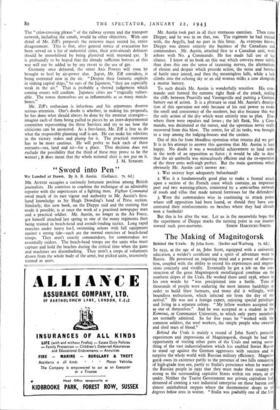" Sword into Pen 7
We Landed at Dawn. By A. B. Austin. (Gollancz. 78. 6d.)
MR. AusTiN occupies a curiously fortunate position among British journalists. He contrives to combine the technique of an admirable reporter with the experiences of a fighting man. Fighter Command owed much of its rare vigour and authority to Mr. Austin's first- hand knowledge as Sir Hugh Dowding's head of Press section. Similarly, this new book, on the Dieppe raid and the training that made it possible, is at once the work of a practised newspaper man and a practical soldier. Mr. Austin, no longer in the Air Force, got himself attached last spring to one of the many regiments then being trained in beach-head and assault-landing tactics. Long rapid marches under heavy 'oat swimming ashore with full equipment against a strong tide—such are the normal exercises of beach-head troops. They aren't exactly commandoes, for commandoes are essentially raiders. The beach-head troops are the units who must capture and hold the beaches during the critical time when the guns and machines are disembarking. They aren't a corps of volunteers drawn from the whole body of the army, but picked units, intensively trained as units. Mr. Austin took part in all their strenuous exercises. Then came Dieppe, and he was in on that, too. The regiment he had trained with, the Argylls, had no part in this foray. As everyone knows, Dieppe was almost entirely the business of the Canadians and commandoes. Mr. Austin, attached first to a Canadian unit, went ashore with No. 4 Commando. He has made full use of his chance. I know of no book on this war which conveys more subtly than does this one the sense of tautening nerves, the alternations of elation and despair which precede action, the noise and heroics of battle once joined, and then they meaningless lulls, while a lark climbs into the echoing sky or an old woman milks.a cow alongside a mortar battery.
To such details Mr. Austin is wonderfully sensitive. His com- mando unit formed the extreme right flank of the attack, scaling the cliffs between Pourville and Varengeville and putting a German battery out of action. It is a pleasure to read Mr. Austin's descrip- tion of this operation not only because of his real power to evoke the smell and consistency of the seashore, but also because this was the only action of the day which went entirely true to plan. Else- where there were repulses and losses ; the left flank, No. 3 Corn- mando, was decimated at the outset, and the operation never really recovered from this blow. The centre, for all its tanks, was brought to a stop among the lodging-houses and the casinos.
Out of this far from bloodless operation what returns did we get? It is in his attempt to answer this question that Mr. Austin is least happy. No doubt it was a wonderful achievement to land tanks in the teeth of an opposition so fierce; would be idle to deny that the air umbrella was miraculously eficient and the co-operation of the three arms well-nigh perfect. But the main questions which obviously Mr. Austin can't answer are: i. Was secrecy kept adequately beforehand?
2. Was it a fundamentally good plan to make a frontal attack upon a section of the French coast which contains. an important port and two watering-places, connected by a semi-urban network of roads and villas that made natural fortresses for the defenders?
3. Were the commanders wise in continuing to attack points where stiff opposition had been found, or should they have con- centrated their reinforcements on beaches where they had already won a foothold?
But this is for after the war. Let us in the meanwhile hope that the experiment of Dieppe marks the turning point in our journey


























 Previous page
Previous page